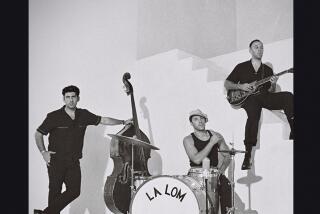Medeski Martin & Wood Find a Groove to the Past
- Share via
Early in their appearance Saturday at the El Rey Theatre, keyboard trio Medeski Martin & Wood made a direct connection with the jazz heritage that inspires their sound.
Playing a surprisingly straight version of Horace Silver’s rhythmic “The Cape Verdean Blues,” the three demonstrated that their twisted blend of groove tunes and space jams isn’t all that far removed from the organ trio tradition of jazz funk and blues.
John Medeski’s Hammond B-3 solo on the well-known Silver song made passing reference to jazz organists from Shirley Scott to Charles Earland and the late Larry Young. The packed, on-their-feet house, most of whom weren’t yet born when Silver recorded his Caribbean-influenced classic in 1965, rewarded Medeski’s efforts with a deafening wave of cheers and applause.
The size and enthusiasm of the crowd at this grunge-jazz summit (which included guitarist Charlie Hunter’s quartet), indicates there’s a strong audience for improvisational music among the under-30 crowd. And that bodes well for the future of jazz and associated schools of improvised music.
But Medeski, bassist Chris Wood and drummer Billy Martin do not play your father’s jazz. Grooves were the heart of the music and with almost every head in the place nodding to the beat, there’s no doubt that rhythm made the immediate connection with the audience.
The rhythmic hooks, ranging from dirty, slow shuffles to big, beefy backbeats, led the way into improvs consisting of Medeski’s whining organ runs, slap-happy percussive effects on the Clavinet or buzzy singing from the Wurlitzer electric piano. Wood alternated between electric and upright bass, often employing a bow on the acoustic instrument for a particularly wiry effect. Martin varied his tom-tom-heavy, tribal sound with sticks on bongos and a host of hand-held shakers and rattles. The result was a clever, sometimes outrageous musical mix.
Guitarist Hunter’s dual saxophone quartet made more of the traditional theme-and-solo format on Bob Marley covers and Hunter’s own R&B-flavored; originals. Tight, tempting interplay between the horns, Hunter and drummer Scott Amendola, as well as rhythmically aggressive solo play, made for a sound deserving recognition from the whole family of jazz fans, not just the twentysomething alternative set.
More to Read
The biggest entertainment stories
Get our big stories about Hollywood, film, television, music, arts, culture and more right in your inbox as soon as they publish.
You may occasionally receive promotional content from the Los Angeles Times.










